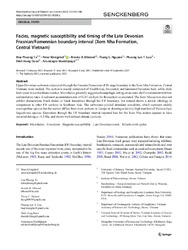Facies, magnetic susceptibility and timing of the Late Devonian Frasnian/Famennian boundary interval (Xom Nha Formation, Central Vietnam)
Ta, Hoa Phuong
Ellwood, Brooks B.
Nguyen, Thang C.
Luu, Phuong Lan T.
Doan, Dinh Hung
Munkhjargal, Ariuntogos
DOI: https://doi.org/10.1007/s12549-021-00506-y
Persistent URL: http://resolver.sub.uni-goettingen.de/purl?gldocs-11858/11069
Persistent URL: http://resolver.sub.uni-goettingen.de/purl?gldocs-11858/11069
Ta, Hoa Phuong; Königshof, Peter; Ellwood, Brooks B.; Nguyen, Thang C.; Luu, Phuong Lan T.; Doan, Dinh Hung; Munkhjargal, Ariuntogos, 2021: Facies, magnetic susceptibility and timing of the Late Devonian Frasnian/Famennian boundary interval (Xom Nha Formation, Central Vietnam). In: Palaeobiodiversity and Palaeoenvironments, Band 102, 1: 129 - 146, DOI: 10.1007/s12549-021-00506-y.
 |
Dokument öffnen: |
Upper Devonian carbonates deposited through the Frasnian/Famennian (F/F) stage boundary in the Xom Nha Formation, Central Vietnam, were studied. The section is mainly composed of fossiliferous, brecciated, and laminated limestone beds, while shale beds occur in a subordinate number. Microfacies generally suggests a hemipelagic setting on an outer shelf environment with low sedimentation rates. A sediment accumulation rate of 0.217 cm/kyrs for this section is calculated. The Xom Nha section does not exhibit characteristic black shales or black limestones through the F/F boundary, but instead shows a similar lithology in comparison to other F/F sections in Southeast Asia. The carbonates yielded abundant conodonts, which represent mainly cosmopolitan species but the section differs from most sections in Europe in showing relatively high numbers of Palmatolepis linguiformis species. Deposition through the F/F boundary interval reported here for the Xom Nha section appears to have occurred during a ~1.2 Ma, and shows well-defined climate cyclicity.


